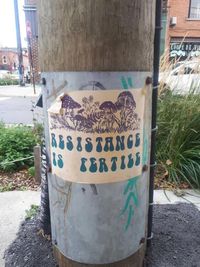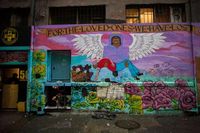The recent announcement of Bill C-22, An Act to Amend the Criminal Code and the Controlled Drugs and Substances Act, carries complex implications for Tiohtià:ke, also known as Montréal. As our city enters its third month of a curfew that has been devastating for people who use drugs and people who are unhoused and routinely criminalized, the idea of legislation that may lessen the criminal legal burden on these communities would be welcome.
“However, the amendments proposed by Bill C-22 fall painfully and disappointingly short of the necessary, large-scale changes that are required to truly address the disproportionate impacts of drug prohibition and the criminal-legal system on marginalized and disenfranchised communities.”
This includes Black and Indigenous communities and other racialized groups, people who use, share, and/or sell drugs, people who are unhoused and precariously housed, people living in poverty, and people living with mental health conditions.
While we welcome the elimination of drug-related mandatory minimum penalties (MMPs), which comes after years of these types of sentences being struck down in various courts, this simply returns us to a version of deadly repression that was in effect before Stephen Harper’s Conservative government was in power. It does nothing to address the decades-long war on drugs that began long before Harper and that, as Bill C-22 shows, is carried forward in Liberal policies. A bill cannot be framed as “anti-war on drugs” if it does not, in fact, end or even reduce the mandate of police to investigate and stop drugs from being used, sold or shared.
These shortcomings are unacceptable given the change needed to address the crisis of drug poisonings across the country, including here in Tiohtià:ke/Montréal, starting with drug possession decriminalization. As in other places throughout the country, the pandemic has exacerbated the toll of the overdose catastrophe here, prompting city council to call on the federal government to decriminalize drug possession, although community groups had been pushing for more direct action through an exemption request from the Controlled Drugs and Substances Act.
This means that the demands of the people affected, as well as local community groups and advocates, have been watered down at the municipal level, and then again federally. Unfortunately, community recommendations and evidence-based practices are routinely ignored, as our provincial government hasn’t even responded to a letter sent in early December 2020 advocating for the decriminalization of drug possession.
In keeping with this political disconnect, Bill C-22 simply encourages the police to “consider” not laying criminal charges for drug possession. We cannot rely on the judgment of the actors implicated in criminalizing people who use drugs. This discretion looks like SPVM officers tearing up the travel attestation of someone making their way to a supervised consumption site after curfew or charging another person for drug possession in a similar situation. Admittedly, the advancements proposed through Bill C-22 go beyond simple drug possession, as all drug-related MMPs would be repealed, including trafficking, importing, exporting and production.
“But the tool of criminalizing people who use drugs (or people who are presumed to possess them, often based on racial and/or social profiling) remains a powerful way in which the police in and around Tiohtià:ke/Montréal seek to surveil and control communities.”

Every infraction for which the MMPs are being removed will still carry a maximum penalty of life in prison. There is no evidence to suggest that simply removing MPPs will end racial and social disparities in sentencing as those disparities exist in all types of criminal law. When prosecutors are encouraged to favour sentences that can be served in the community, they are often setting people up to fail through conditions that are not realistic and through continued surveillance and police harassment.
This surveillance and control is also supported by “anti-gang” and anti-gun efforts, for which many MMPs would stay intact under Bill C-22’s proposed amendments. Locally, these efforts are often synonymous with the wildly disproportionate policing experienced by Black individuals and neighbourhoods with the highest proportions of racialized people in the city. It is well known that these neighbourhoods, many of which are in North-Eastern parts of Montréal, are the grounds of consistent surveillance and harassment by police.
In recent years, further policing has been set up under the guise of the SPVM’s anti-gun squad. This unit is 42 times more likely to arrest and charge Black people than white people. In fact, this unit actually lays more charges for drug offenses than for gun-related offenses, demonstrating how the use of the criminal law to target racialized communities, in this case specifically Black communities, can easily shift from one mandate to another while ultimately maintaining the status quo. The concept of “street gangs” as a way to justify policing and criminalizing Black people here is the status quo, dating back to the 80s when the idea of (racialized) street gangs became popularized without actual evidence.
Finally, we must remember the context of policing in this city more generally. For decades, the SPVM has viewed its role as the main actor in “taking care of disorder”. We also live in the province that has relied the most heavily on policing throughout the pandemic, first through tickets, then through the province-wide curfew which remains in effect in red zones including Tiohtià:ke/Montréal. Furthermore, despite months of protests and work led by the Defund the SPVM Coalition, the city recently decided to continue to increase its police budget while simultaneously decreasing its housing budget.
“Real change requires much bolder policies – policies that recognize the failure of prohibition and the violence of the criminal legal system, and finally accept that the solutions exist within our communities and do not include the police.”
People across Canada have been asking for policies that remove unwanted contacts with police and shift funding away from police and towards community-led social change, but this Bill misses this opportunity. We need transformative policy change, now, not performative policies that protect an oppressive system while giving politicians a pat on the back for acting progressive. This Bill is just that: performative.
Written By: Kira London-Nadeau, Alexandra Holtom & Assaf Azerrad, on behalf of the CSSDP Tiohtià:ke/Montréal, CSSDP Concordia, and the Defund the SPVM Coalition






